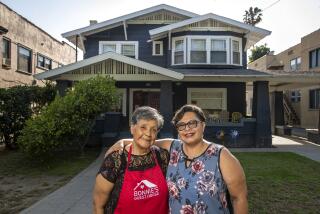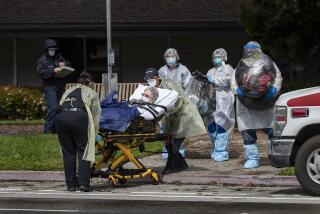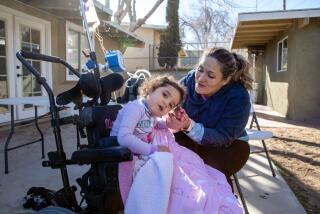Sunair Seeks to Expand Service in Survival Bid
- Share via
The financial battle to survive amid drastic government funding cuts is still being fought by the Sunair Home for Asthmatic Children in Tujunga, but school officials say they are hopeful the facility will remain open.
School administrators had predicted that the 48-year-old school, the only live-in rehabilitation facility of its kind in California, would close early this year when county officials reduced funding for the school. But private donations, staff cutbacks and fund-raising efforts have kept the facility afloat throughout this year.
As a move toward expanding the school’s enrollment, Sunair has applied for state approval to ease restrictions on the 39-bed home so that emotionally troubled children, along with physically handicapped children, can be admitted.
Ray Shapero, executive director of Sunair, said she is scheduled to meet this week with officials from the state division of community care licensing, part of the Department of Social Services, to discuss Sunair’s application for a community care license.
Fourteen asthmatic and diabetic children ranging from age 5 to 17 are being treated at the facility. If a community care license is granted, Shapero said, the school’s patient maximum could be increased to 45.
Joseph Brocato, a spokesman for the community care licensing division, said it could be several weeks before issues involved in granting such a license can be resolved.
But Shapero said she was sure Sunair would get the license.
“I see no reason why we shouldn’t get it,” Shapero said. “This is such a marvelous facility, but we have these empty beds which are not being used. People are always talking about how there are not enough places to treat neglected and abused children, and this would be the perfect opportunity for these children to get needed assistance.”
Delinquents Not Wanted
If the school is not granted the license, it may have to discontinue operations and close, administrators said.
“I don’t even want to think about it,” said Harriet Rinkov, president of the Sunair board of directors.
Shapero said Sunair did not want to treat delinquent children or youths with antisocial behavior. “We are looking for children from broken homes or abused children who could benefit from being in this kind of open atmosphere,” she said.
She said the asthmatic children at Sunair receive medical and psychological treatment, and “we could give the same kind of treatment to the handicapped children.”
Sunair, which is operated by a private, nonprofit corporation, teaches patients to control their asthma through medication and exercises aimed at restraining their emotions.
Sunair’s population was severely affected last year when the county’s California Children Services program cut back its funding for patient stays at the home, thereby reducing the length of a patient stay from six months to two months. Officials, explaining that their decision to reduce funding was a medical decision rather than a budgetary one, said there was not sufficient medical information to support the extended treatment period.
More Patients
Sunair administrators protested, saying that the patients could not become self-sufficient in two months and learn to control their symptoms and attacks.
The facility’s patient population, which reached a low of three in January, has been rising steadily since then, but Shapero said the facility has been unable to attract additional patients from physicians and state hospitals that referred children to Sunair in previous years.
“All of our referrals have just about dried up, and we can’t understand why,” Rinkov said. “We sent out hundreds of letters to hospitals and physicians this summer in a massive marketing effort, telling them about Sunair and how it could really help children. But we hardly got any response back.”
Dr. Warren Richards, director of the allergy department at Childrens Hospital of Los Angeles, said the number of children the hospital refers to Sunair for extensive treatment has declined because of the introduction of newer methods of therapy that have been developed in the last few years to help asthmatic children.
“Because of the therapy, there are less children who require the services of facilities like Sunair,” Richards said. “But there is still a need for Sunair, especially for children of poorer families who keep missing school and making repeated visits to county hospitals. Unfortunately, there is a high turnover of doctors at these hospitals, and many of the newer doctors don’t know about Sunair. We still need it.”
But for the moment, Shapero and Rinkov can only wait.
“I think I can see the light,” Shapero said. “I know the need is there. And I know we will get the license. Sunair has just done too much good to fail.”
More to Read
Sign up for Essential California
The most important California stories and recommendations in your inbox every morning.
You may occasionally receive promotional content from the Los Angeles Times.














